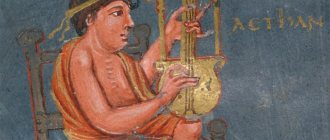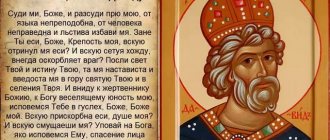Text of prayer Psalm 136
The prayer is read in Church Slavonic if there is a service in the church. This is done for parishioners who want to get closer to the Kingdom of God. The text in Russian helps you understand the plot; you can read it at home.
In Church Slavonic with accents
In Russian
In Russian
By the rivers of Babylon, there we sat and wept when we remembered Zion;
on the willows, in the middle of it, we hung our harps.
There those who captivated us demanded words of song from us, and our oppressors demanded joy: “Sing to us from the songs of Zion.”
How can we sing the song of the Lord in a foreign land?
If I forget you, O Jerusalem, forget me, my right hand;
stick my tongue to my throat, if I do not remember you, if I do not put Jerusalem at the head of my joy.
Remember, O Lord, to the children of Edom the day of Jerusalem, when they said: “Destroy, destroy it to its foundations.”
Daughter of Babylon, desolator! blessed is he who repays you for what you have done to us!
Blessed is he who takes and dashes your babies against a stone!
History of writing
The authorship of the chant remains with the Jewish king David. The style of writing corresponds to the manner of presenting the thoughts of the ruler of antiquity, although previously the psalm was considered anonymous. After much work was done to translate Greek and Latin sources, the creator of the psalm was identified.
At that time, Jerusalem was going through difficult times. The kingdom of Judah was attacked by the Babylonians. The song of praise is dedicated to this event, which became a tragedy for the entire Jewish people. The Babylonian army managed to break through the defenses of fortified Jerusalem and began to destroy everything in its path.
All shrines were looted and destroyed, many city residents were killed while trying to resist. Those who remained from the people of Israel were captured and taken to Babylon, where they worked as slaves for the oppressors. The people lost their homeland, but not their faith.
Text in Church Slavonic
On the rivers of Babylon, where we sit and weep, we will always remember Zion:
on the willows in the middle of both our organs.
For now you asked us about the words of the songs, and you who led us about the song: sing to us from the songs of Zion.
How shall we sing the song of the Lord in a foreign land?
If I forget you, Jerusalem, my right hand will be forgotten.
Let my tongue cleave to my throat, lest I mention it to you, lest I offer Jerusalem to you, as at the beginning of my joy.
Remember, O Lord, the sons of Edom on the day of Jerusalem who said: exhaust, exhaust it to its foundations.
Accursed daughter of Babylon, blessed is she who will reward you with your reward, which you have rewarded us:
Blessed is he who has and will dash your babies on the stone.
Interpretation of Psalm 136
Psalm 136 contains a large number of historical events that actually happened. To understand this issue in detail, we suggest analyzing each verse of the work.
- Verse 1-3. These verses describe the life of the Babylonians. The Jews could not accept their fate. These were not a proud and God-fearing people. And in the splendor of the Tigris and Euphrates rivers, they created their music. Being naturally gifted, they played musical instruments day and night. The Lord was their only consolation in their difficult fate, all songs were dedicated to Him.
- Verse 4-6. Being slaves to the Babylonian ruler, the united memory of the Israelites could not disappear. In their free time, they dreamed of how they would restore their homeland and return to their own lands. A good life was for them a torch that gave hope for return.
- Verse 7-9 The Jews never waged war without cause. They saw no particular reason for the bloodshed. But at the same time, there have always been peoples who sought to undermine the way of life of the Israelis. The Edomites, descendants of Lot, were from among these tribes. The tragedy that touched God's chosen people caused them animal joy.
Orthodox Life
Ending.
This amazing monument of literature of the Holy Scripture begins, it would seem, with the saddest minor note: “On the rivers of Babylon, there weeping and weeping, we never remembered Zion.” This first verse is the key to understanding Psalm 137.
The first interpretation of this verse is concrete historical. Agriculture in the Middle East is associated with an irrigation system or water canals, without which the cultivation of agricultural crops in hot and sometimes desert climates is impossible. Therefore, the densely populated Babylonian Empire was in great need of bread and food in general. Therefore, digging channels for water and for growing crops was an important labor-intensive, and in the conditions of the Middle Eastern heat, a painful task. Slaves were sent to do such hard work, as in Soviet times prisoners were taken to build the White Sea-Baltic Canal.
The rebellious Jews were defeated enemies for Nebuchadnezzar, which means they automatically became slaves. They were used for the most difficult work, primarily for digging canals that were vital for Babylon. These are the rivers on which the Jews sat and cried. In addition, as prisoners and slaves, they were not allowed to settle in densely populated areas and in Babylon itself. They found refuge in secluded desert places on the banks of the Tigris and Euphrates rivers and their numerous canals.
There they were sad for their lost homeland and their main shrine - the Jerusalem Temple.
This verse also has a spiritual meaning.
Rivers in the Holy Scriptures are often a symbol of life, a symbol of the atmosphere in which an organism develops (most often a tree or some other plant; a grapevine, for example, is a symbol of a person or a people). And in the psalm “On the Rivers of Babylon” the confrontation between good and evil, between the shrine of the true faith and paganism as a demonic religion is very clearly visible. In the psalm, Zion (the mountain on which the Jerusalem Temple stood) is, of course, the shrine of God, and Babylon is the personification of sin and paganism. Therefore, the Jews sat on the rivers of Babylon and wept. This can be translated as sitting in a swamp, in stinking mud, and crying.
But there is no hopelessness in this crying either. No. This is not a cry of despondency. And don’t cry for a suicidal person before committing suicide. No. This is a cry dissolved by hope in God, the cry of a fallen sinful person, in which true faith is resurrected. Because here, in the swamp of paganism, the human soul does not mix with paganism, but remembers Zion. O beloved Zion!
And let the further verses of the psalm tell about the further suffering of the Jews! The fact that they hung their organs on willow trees, that is, musical instruments that they played during worship in the Jerusalem Temple on Mount Zion (Ps. 136:2). The fact that the Babylonians, who captured them, of course, mocking the Jews, asked them to sing their prayers in mockery (Ps. 136: 3). But for the Jews this was impossible. The temple is destroyed. To perform worship outside of it, on a foreign land, is blasphemy and sacrilege: “How shall we sing the song of the Lord in a foreign land?” (Ps. 136:4).
But at the same time, it is unrealistic to perform divine services on earth, but in the soul it is accomplished, because true faith is resurrected and love for Zion burns in the heart, like the glow of a new dawn.
“If I forget you, O Jerusalem, my right hand will be forgotten. Let my tongue cleave to my throat, lest I remember you, lest I offer Jerusalem, as at the beginning of my joy” (Ps. 137:5, 6).
“Jerusalem, Zion, the temple, God - this is for me the power of my right hand, my tongue, my mind, my joy and joy,” the Jew captive in Babylon seems to say. – If I forget Zion, then the strength will leave my right hand (right hand) and my tongue will stick to my larynx. The strength will leave me. Because God alone is the Giver and Source of life.” That's what these verses are about.
The holy fathers tell us the same thing. St. Athanasius the Great and Blessed Theodoret of Cyrus write that the right hand is the help of God.
“And if I forget Jerusalem, then God’s help will cease,” says the Jew in Babylon through the mouth of the holy prophet and King David.
St. John Chrysostom also gives an interesting and soulful interpretation of the sixth verse of the psalm (namely, the place “unless I offer Jerusalem as at the beginning of my joy”): “The word: I will offer means: I will put it at the beginning of the song; it expresses a strong desire, or better yet, love and ardent longing for the city (Jerusalem).” Blessed Theodoret echoes him: “The height of joy for me is seeing you, Jerusalem, your renewal, triumph among you; because in them I find true pleasure.”
This is followed by the seventh verse: “Remember, O Lord, the children of Edom, who said in the day of Jerusalem, “Deplete, exhaust it to its foundations.” Here, through the mouth of Saint David, a Jew in Babylon recalls all the horrors that the Babylonians and Canaanites committed under their leadership when they destroyed Jerusalem and the temple. In essence, the sons of Edom are the pagan peoples of Canaan. First of all, the sons of Edom - the Edomites - are descendants of Edom, who came from the line of Esau - the brother of the patriarch Jacob. They hated the Jews so much that they shouted when the Babylonians destroyed Jerusalem: deplete it, deplete it to the ground. This means: destroy, destroy to the ground, so that no memory remains. That is, such rage, ready not just to kill, but to tear apart and destroy. First of all, it is hatred of the sacred and of God. In spiritual terms, of course, we are talking about demons here.
And the personification of their hell in a symbolic sense on earth is Babylon with its pagan ziggurats, astrology, magic, occult religious satanic sciences. Therefore, in both the eighth and ninth verses of the 136th Psalm it is said: “Wretched daughter of Babylon, blessed is she who will give you your reward, which you have rewarded us. Blessed is he who is and will dash your babies against a stone.” That is, the daughter of Babylon is cursed. Here repentance is the opposite of repentance. This is an insane, terrible disease of pride, therefore it is worthy of pity and will perish. This is how the holy fathers wrote about this. Saint Athanasius of Alexandria (the Great): “This is a prophetic word, and it depicts the fall of Babylon.” Saint John Chrysostom: “Here the prophet predicts the misfortunes that will befall Babylon, and, because of the disasters that are about to befall it, calls it unfortunate.” But at the same time, this passage says in a spiritual sense that we must hate the “daughter of Babylon” - our sins and passions, and Satan and demons. Love God, love man, or hate everything. This is where our reward lies: in rejection, in resistance to sin.
Now about the most difficult and last ninth verse: “Blessed is he who has and will dash your babies against the stone.” There is, of course, an allegory here. And there is no bloodthirstiness. This verse speaks of the “babies of the daughter of Babylon” - about sins and even about their embryos, about their beginnings, the so-called demonic causes. This is a holy and ascetic indication from Holy Scripture, and therefore from God Himself, on how we should deal with sin. We must “have”, that is, take them. Here this means realizing clearly what sins we have and what they are. As they say in medicine, a correct diagnosis is already half the way to recovery. It is important to break sin in the bud, not to feed it to yourself, not to wait for it to turn from a small “gremlin” into a huge “Godzilla.” It should be broken in the bud against a stone. And the stone is our Lord Jesus Christ. Quite often, a stone appears as a symbol of the Savior in the Holy Scriptures. That is, ask the Lord for forgiveness of your sins, sincerely repent, go to confession in church with a priest, try not to repeat your sins. This is what it means to smash the “babies of the daughters of Babylon against a stone.”
Now comes the time of Lent. And we need to realize that each of us sits on the rivers of Babylon, sits in sin, often attacked by demons, but only God can deliver us from this stinking slurry of passions, from these hordes of “Babylonians” and “sons of Edom.” The main thing is not to forget the heavenly Zion, not to forget the new mountain city of Jerusalem. And God will surely smash our enemies against the stone of His loving power and save us.
We just need to repent, realize that we are in damned Babylon, and cry out to God for salvation. And this wonderful miracle will happen. Having rejected the curse of pride, we will enter the bliss of humility. Having gone through the test of Great Lent, we will enter the Great and Bright Resurrection of Christ. And Christ will rise for us and in us. You only need to create Zion from your heart to the Almighty and erect a temple in it, into which God will certainly enter and dwell.
Priest Andrey Chizhenko
When they sing "On the Rivers of Babylon"
The chant “On the Rivers of Babylon” is one of the prayers of repentance that prepares us for Lent. From the Week of the Prodigal Son (the second preparatory week before Lent) and the two subsequent weeks until the week of the Last Judgment, we hear this chant on Saturday evening at the central part of the All-Night Vigil (polyeleon) after 134 (“Praise ) and 135 ( “ Praise the name of the Lord ” ) Confess to the Lord that He is Good " ) psalms of praise.
Mention of the text of the psalter in literature, culture, music
Sacred music has been written to the words of chants since the Renaissance. Among the composers who addressed the text of the psalm:
- J.S.Bach;
- A. Dvorak;
- G. Verdi.
Interesting fact
Verdi’s work on the text of the psalm “Va, pensiero” from Act 3 of the opera “Nabucco”, dedicated to Nebuchadnezzar, is especially famous. Despite the fact that in the story the song is sung by captive Jews, the chorus has become the unofficial anthem of Italy. The people loved “Va, pensiero” so much that they sang it at Verdi’s own funeral.
In addition, the 136th is mentioned in the novels of F.M. Dostoevsky, J. Sand, W. Faulkner, R. Zelazny. It was repeatedly performed to different tunes by pop artists, including the ensemble “Boney M” (the song “Rivers of Babylon” appeared in 1978)
4
April
2010
The all-Russian premiere of V. Khotinenko’s film “Pop” about the everyday life of a priest in Nazi-occupied territory took place. Its original title was “Along the Rivers of Babylon.”
For many believers who have been visiting the temple for a long time, the sad “On the rivers of Babylon...” is a sign of the beginning of the penitential time of preparation for Great Lent. The psalm calls us to remember the Paradise that we have lost, and to the best of our ability to go to the Lord. The repentant Jews were returned from captivity. Let us believe that the Lord will hear our repentance.
Interpretation
Like all psalms, the 136th has, according to the interpretation of St. fathers, several meanings, from the literal-historical to the deeply spiritual.
Lament for the Motherland
This is precisely the historical content of the chant. The “Babylonian rivers” mentioned by its author are the Tigris and Euphrates, between which this country lay (hence another name for the region - Mesopotamia). Perhaps we are also talking about R. Chebar, a tributary of the Euphrates. Prophet Ezekiel, who was among the captives, mentions this river in his prophecies.
The psalm itself is permeated with longing for Jerusalem, its Temple. The pain of those praying is intensified by the misunderstanding of the surrounding pagans. According to the interpretation of the bl. Theodoret of Cyrus, the Babylonians wanted to hear from the captives the “songs of Zion”, the hymns of their worship. But is this possible on a foreign, pagan land?
The last lines predict the death of the enemies of Israel who mock the true faith.
However, St. John Chrysostom notes that this is not only a prophecy, but also “the essence of the words of the passion of the captives, who demand great punishment, some amazing and extraordinary execution... But this is not so in the New Testament; on the contrary, we are commanded to give drink and food to our enemies and to pray for those who offend us.”
Worldly wisdom
St. John Chrysostom draws attention to another meaning of the text. Speaking of crying “on the rivers of Babylon,” he notes:
“While they possessed benefits, they were constantly dissatisfied and insolent; and when they were deprived of them, then they began to desire them; This is why God deprived them, in order to arouse in them a greater desire. This is what God often does. When we, enjoying His blessings, do not feel it, He deprives us of them, so that we will understand the deprivation and again try to acquire them.”
Moving away from God
The 11th century Greek theologian, Euthymius Zigaben, draws attention to the spiritual meaning of the text: “the rivers of Babylon,” fickle, confusing the mind, can be called a rebellious world. The soul of every believer cries for the lost Paradise, strives to reject all temptations, to return to the Father’s house:
“... Having become captives of demons through crime, we are expelled from paradise and have reached the point of confusion with this world. Therefore, we must always remember the blessed paradise of our former life and ask God to return us again to paradise - our former fatherland, and to free us from this country of exile.”
On the rivers of Babylon. Listen
On the rivers of Babylon. A. Arkhangelsky:
Music by A. Arkhangelsky. Performed by the ensemble of the temple in honor of the icon of the Mother of God “Znamenie-Alabatskaya” in the city of Novosibirsk. Conductor - A. Roslyakov.
On the rivers of Babylon. Everyday chant:
An ancient tune from the use of the Synodal Choir. Performed by the choir of the metochion of the Holy Trinity Sergius Lavra in Moscow, regent - V. Gorbik
Alexander Arkhangelsky is a composer and regent of the late 19th and early 20th centuries, the author of many spiritual works, including two liturgies and an all-night vigil. One of the representatives of the Novomoskovsk school of composition, associated with the activities of the Synodal Choir - the oldest professional group performing spiritual and secular chants.
On the rivers of Babylon. Valaam chant:
Contents: what they sing about
Common to all interpreters is the conviction that we are talking about a historical event - the “Babylonian captivity” of the Jewish people. It is known that it happened less than 600 years before the birth of Christ.
In 605 BC. the successful commander, the tough ruler Nebuchadnezzar II, becomes the king of Babylon. He almost immediately begins to conquer the surrounding countries - Egypt, Media.
Judea did not escape this fate either. The prophets had long predicted disaster for her people for deviating from the faith of the True God to pagan idols. The Babylonian king became an instrument of God's wrath. At the same time, the attempts of the Jews to defend their independence only led to a worsening of their situation:
- in 603, King Joachim of Judah submitted to Babylon without a fight, but a few years later the Jews stopped paying tribute;
- in 597, after a year of devastation of the territory of the Jewish state, Nebuchadnezzar captured Jerusalem, plundered the Temple, captured 10,000 Jews from noble families, as well as King Jehoiachin;
- in 586, a terrible tragedy occurs: angry at the next uprising of the conquered people, the king of Babylon again takes Jerusalem; this time the Temple is completely destroyed, and the Jews are deported to Babylon, except for a small remnant.
"By the Rivers of Babylon" Gerhard Fügel
In their new habitat, they initially worked on the construction of the buildings of Babylon, like slaves, only after the death of Nebuchadnezzar the captives began to receive the best thing at that time - personal freedom.
Historical sources indicate that many of them were able to get a good job, some became government dignitaries. Despite this, the Jews retained their faith, customs, and memory of the holy city of Jerusalem, and many deeply repented of the sins that led to the disaster.




